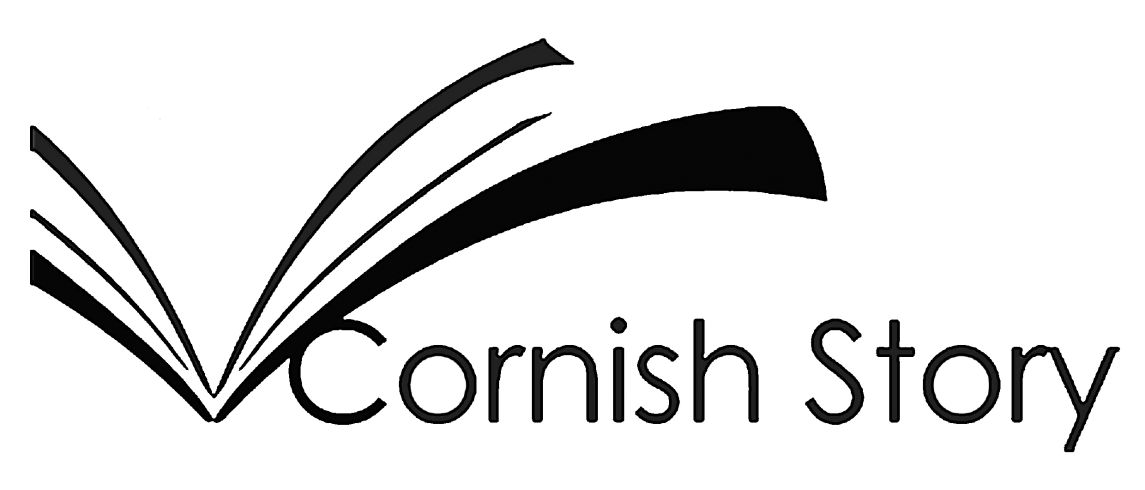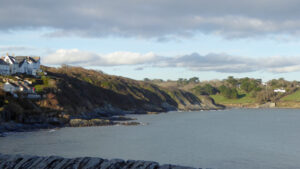 Portscatho on New Year’s Day 2023
Portscatho on New Year’s Day 2023
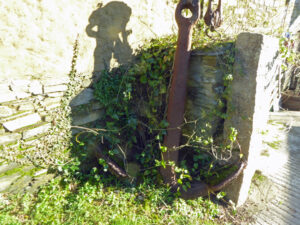
Bert Biscoe brings us another of his poems, this one in reflective mood – of things past, of people past, of Cornwall past.
Goodnight, my land. Goodnight!
Dedicated to Hilary Thomson of Portscatha
I remember in the not-so-dim
And still fresh past
When pilgrims and commuters
Shifted from town to town,
When large signs spoke ‘Welcome!’
When families formed tangles
Of roots through topsoil
To turn-out on furious days
Of grief and mist to sing
And sit silent, and stand and kneel
And gather in weak sunshine
To hear a single solemn peal –
Ah yes! You could read a town
By its funerals, and find it
Flat on its back under garlic
And yew, and lovers wandering
With nuptial excitement gripped
In clasped hands, laughter
And generosities of breast, swinging
Between rows of related names –
Love found depth and harmony
In the squirrel acres
Of thrush-preached ground.
Nowadays, in confusion,
Movers and shakers speed
Between junctions, demanding
Unimpeded ribbons of graded
And calculated parabola
To replace the much-loved
But outmoded ‘corner’!
Shaved mounts, infilled banks
And bridges to tame the deep excess
Of valleys, red and white cells
Overcrowd pinch-points
To practice dark arts of congestion,
And scolding bells ring
In microwave reaction
To mark radioactive combustion
And irradiated morsels tabled
Before all is still in the engine –
Everything rams the moment,
Poetry lies crushed under boots
And voices of demand, the land,
Scalped of thrift and chamomile,
Of rye and cooch, of defiant
Thorns bent before the gale;
Everything sports mechanical lizards
And scooping iron fists shifting
The cheek to be summer-kissed
Into the bitumen and aggregate
Shadow, the grey bands
Of bridging rings constructed
To carry strands of commuter
Rivers according to plans
For flow and optimum urban
Speed to add and invest
Time-realised funds to hordes
Tied-up in illusions of value
Until wealth lies helpless, a gasp
Of breath from lungs written
In binary code to resemble
In function and depiction
A road between markets,
And criers chiming ‘O Yay!
O Yay!’ and Mayors clapping
The overtures of spring
Between boundary stones
Of history and writ –
And we escape the tyrant,
The scripted word, the clucking
Tongues of old tradesmen
Who observe from the kerb
Declining workmanship
And complain in leaning
On the chancel rail to watch
The tide usher swan and eel
Between green walls and pigeon
Ghettoes, of buddleia-bedraggled
Bridges, vows and declarations
Between innocent streams and tides,
Abrasive oceanic saline campaigns
Of geological attrition, to claims
Unbounded by stannary tradition,
For Lost Lands to perpetuate
Misty chimes of mournful bells –
We escape and return to lanes
Of familiar sentimental courting,
Knotted in rhythms of quiet life.
We tighten laces, button coats,
Shoulder sacks of snacks and water,
To hike shoulder to shoulder
With a daughter who refuses
To pay for parking to patrol
The edges, the coast, the lip
And toe of their land, who rounds
The spiky sloe tree corner,
Riding the slip of pliable mud,
Counting the lanes of casual paths,
Breaking the tall backs of stiles
Over hedges and, latching gates
As good citizens should,
Coming suddenly – ‘Blimey!’ – upon
The cliff-top Coffee House queue,
A horde of destination designers
Herding espresso Greta children
Into lines of custom that churn
The ground and kick the cake
From between cloven hooves
And hear the flush of Armitage Shanks
Against the rush of jealous waves,
The brush of comb through blinding
Hair, the rattle of chains, the cranks
Of dropping Packet anchors
To rest in the shelter of Aberfal,
To stitch and repair care-worn sails
And await replies to urgent mails,
To pay a share of Lugger retirements –
The anchor leans against a barn,
The old village tombstones generations
Into chilly New Year harbours
And the butcher pulls shut his doors
And carries his cleaver home –
Rust insinuates a friendship
And beauty of corrosion, there is
Nobody there – the Farm Shop sign
Knows no other word but ‘OPEN’,
But not a crust of bargain there,
And old anchors declare
The high proportion of skippers
And captains who have taken the stair,
Salts of Horn and Hope, who’ve plied
Their trade between empires and stations
And come to watch girls and boys
Goosebump along the harbour wall,
Filling their youth with Portscatha air
And leaping up and out, tightly
Tucked, a human satellite,
Curving down, howling for the hand
Of ‘GERONIMO’ to run Atlantic
Fingers through carefree hair –
But, along the cliff, past boards
And gates which prohibit and exclude,
Shouting ‘Private Property’
In swift strokes of scarlet bristle,
To any who pass or pause to stand
And stare into the echoing rooms
And slamming doors of homes
That have forgotten the rough and tumble
Of occupation, but whose share
Rises upon the spreadsheet scale, whose
Asset value is enhanced by roads
Chewing farms to get pension owners
And safe-haven-in-volatile-market-
Pilgrims there to view, and back
To civilization in time for dinner
And erudite swings of the cynical cat:
A coffee shop in the middle of Nowhere!
Benches rising in caffeine terraces,
Winter picnic sequestration of slopes!
Whilst below, ghostly voices
Wander between the folds and pleats
Of time and wonder who knows,
Between the pale disc of afternoon moon
And the tight bud of confusion’s rose,
The names and triangulations of marks
That tell where, in the unreadable face
Of inscrutable land, its coves
And caves, its guardian rocks
And redundant anchors, the marks
Might lie which will tell
Future hunters, short of time
And light in predatorial winters,
Where fish might best be found –
On the door of the Heritage Centre
A note: ‘Closed till Spring’ –
Blotted yellow and indigo
By dehumidifying condensation!
In one of these houses (I know not
Which) the old historian,
Skipper of the erudite ship
Home to still the sea-leg sway
And ease the shallow wheeze of breath,
Picks petals of knowledge from her
Undone hair to leave in heaps
Upon her forgetful stair – the queue
For coffee grows longer – we rush,
Head down, muttering prayer,
Eager to be away from there
And back, back in the arms of our town –
‘It’s a bloody gold mine, you know!’
But where will the lark, we frown,
The harbour of anxious song,
Where the Leatherjacket hurry along
Underground, the soundcheck done –
Where will they hang in this solstice sky?
And where the dead skipper, old Jack,
Talking the talk to his pal, the Bucca,
Where will he go to watch and await
The telltale shadow, the cry to the village –
The shove of seine down the slip –
The scrape of gutting steel along
The step and strop – a fishwife’s blade?
In the corner of her silent room
A slow incessant leaking drip –
‘Good night, my land. Goodnight!’
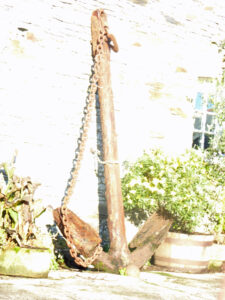
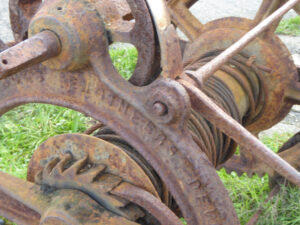
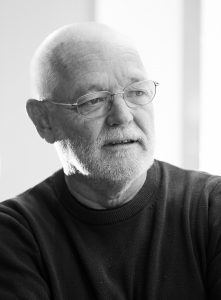 (Photo Steve Tanner)
(Photo Steve Tanner)
Vyager gans Geryow (Bert Biscoe) lives in Truro. He is a poet and songwriter whose work draws on his interests in history, politics, social justice and language. He represents the people of Boscawen Division on Cornwall Council. The Division was formerly called ‘Moresk’ – an unbroken link from civic administration to the hurried escape of Tristan and Iseult from the vengeful wrath of King Mark – Bert tries to invest Cornish values into the demand of modern life. His work is fun, and best read aloud – which he does whenever the opportunity arises, especially with fellow Cornish poet, Pol Hodge. ‘Living in Trurra’ he says ‘means that there is a constancy of running water beneath your feet – there are two clocks which ring the hours dissonantly and out of step – a good environment for poems to flourish in the cracks and shadows. Nowadays, the mullet listen attentively in the lee of the Old Bridge’
